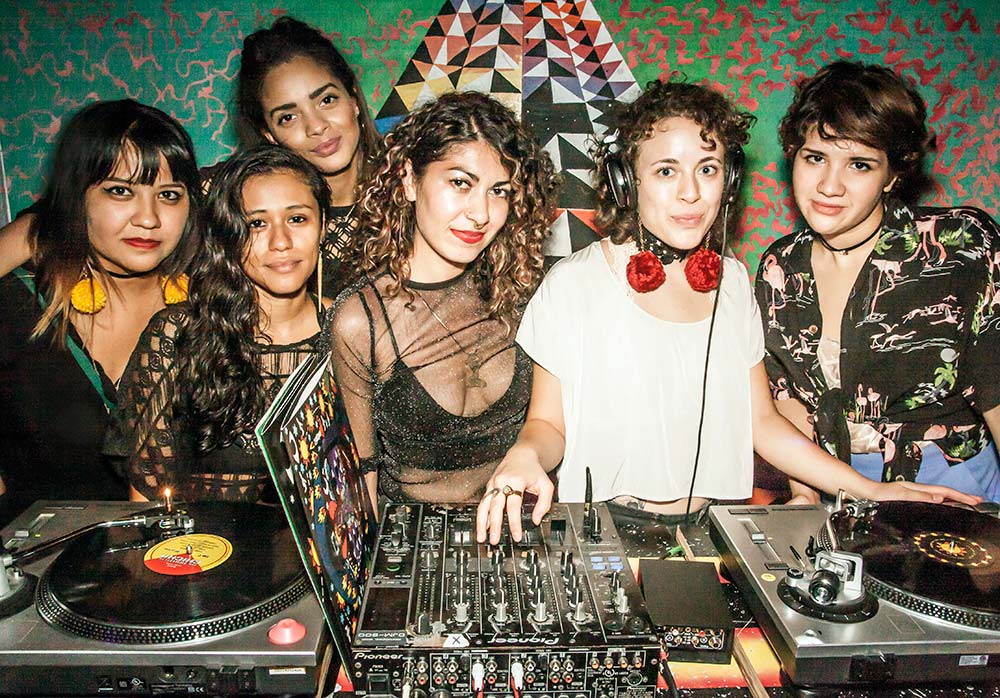In light of International Women’s Day, music editor Meg Firth chronicles the DJ collectives across the world that are bringing women to the forefront of the scene.
It’s no secret that dance music is still largely dominated by men. Take one look at most line-ups and it’s clear to see that female DJs and artists are frequently overshadowed and tokenised. White boy privilege and entitlement has created a protective sphere over the decks, but it’s not here to stay. All-female DJ collectives across the world are storming out of the margins and establishing their rightful residencies within the electronic music scene, creating a space of their own rather than asking permission from the scene’s fragile male gatekeepers.

An invitation into the boys’ club seems to depend entirely on privilege, with straight middle-class white men governing genres that were in fact started by communities from far less privileged backgrounds; early techno blossomed from the gay clubs of Detroit and the playlists of underground cult hero The Electrifying Mojo, whilst house emerged from disco at Frankie Knuckles’ Warehouse in Chicago’s Southside. Now, with all-female, trans and non-binary DJ collectives, labels, booking agencies and training workshops emerging across the world, the sands are shifting beneath the trainers of cis white dudes claiming the turntables.
Casual misogyny within most industries pressurise women to work twice as hard in order to prove themselves as capable, whilst men are more-often-then-not granted a free pass. Speaking to LA Weekly, Maryann “DJ Que Madre” Aguirre of the L.A chapter of The Chulita Vinyl Club expressed “I feel like we have to be twice as good because we’re women, because we’re women of colour especially.” Creating mixes that highlight brown erasure within electronic music, The Chulita Vinyl Club bring together communities of vinyl loving girls and provide “spaces for empowerment and togetherness.” With no snobbery or policy over genre, the collective spans across Texas and California and welcomes all women of color, regardless of culture, race or skillset, tackling the patriarchal inequalities of the DJ scene.
Recognising this hierarchy of privilege, Berlin techno don Paula Temple is a vital force bringing both technological and moral progression to the world of electronic music. After formally founding the label Noise Manifesto in 2015, Temple has begun to dismantle privilege and hierarchies within the scene by giving a platform to those who are marginalised. Each release features “at least 50 per cent artists who identify as trans, female, woman, non-male, non-conforming or queer,” setting to shatter the glass ceiling of the creative industry that keeps the Privileged privileged, whilst those who aren’t are kept invisible. During a 6-year hiatus from the techno scene, Temple sparked creativity within underprivileged kids in Leeds by teaching music and sound technology. With empowering Leeds projects such as MAP and Hope House being threatened by corporate investors, the importance of creative social activism and DIY projects inspiring disenfranchised people has never been clearer.
Equaliser strives to do just that. The Leeds collective are amplifying the talent of local queer, non-binary and identifying-female DJs whilst simultaneously providing workshops to encourage those who want to pursue DJing. Speaking to The Gryphon in November, Equaliser expressed their ambition to “create a free knowledge transfer from women to women, so hopefully in the future there will be cohorts of women who know how to DJ and can pass that on to other women.” Breaking down barriers and partying towards equity and equality, Equaliser have swiftly become an essential part of the Leeds music scene through their monthly DJ workshops and parties.
Similarly, in London, DJ collective SIREN are creating spaces that are free from sexual harassment and misogyny through their inclusive club nights that facilitate their policy of “no bullshit, just dancing.” Made up of nine female-identifying DJs and producers, SIREN are tackling the toxic homogeneity and harassment that riddles London’s electronic music scene with all-female line-ups and features. Making up for all of the missed opportunities for underrepresented artists, their parties spotlight underappreciated talent and highlight that there are plenty of positive and empowering role models for women in the DJ scene. Likewise, in Brooklyn and New York, Discwoman is a collective, platform and booking agency hosting parties worldwide, amplifying the talent and work of trans women, cis women and genderqueer artists, and striving towards true representation within the electronic music industry.
Representation within any industry or scene is crucial, for if people don’t see themselves being represented, they’re going to be discouraged to pursue seemingly unblazed paths. In recent years, conversations concerning the representation of women in music have been louder than ever, bringing with it projects to highlight women in the industry. Spotlighting female producers, DJs and sound engineers, international collective female:pressure have created a database that catalogues the Soundclouds and websites of music women worldwide.
This is not saying that men in electronic music should step aside, but rather stand shoulder to shoulder with women in solidarity towards equity and equality. The epitome of this is Brutaż, the Polish party series and label who commemorate techno and experimental electronic music through inclusive showcase events. Founded by two women and three men, Brutaż host parties that feature established underground DJs alongside newcomers in a celebration of inclusion and empowerment.
When the clubbing scene is so often plagued with harassment, misogyny and hierarchy, platforms like these are vital in creating safe spaces and levelling the industry’s evident gender divide. Without any doubt, the future of electronic music is inclusive.
Meg Firth
Featured image credits: Chulita Vinyl Club by Shelley Haim

